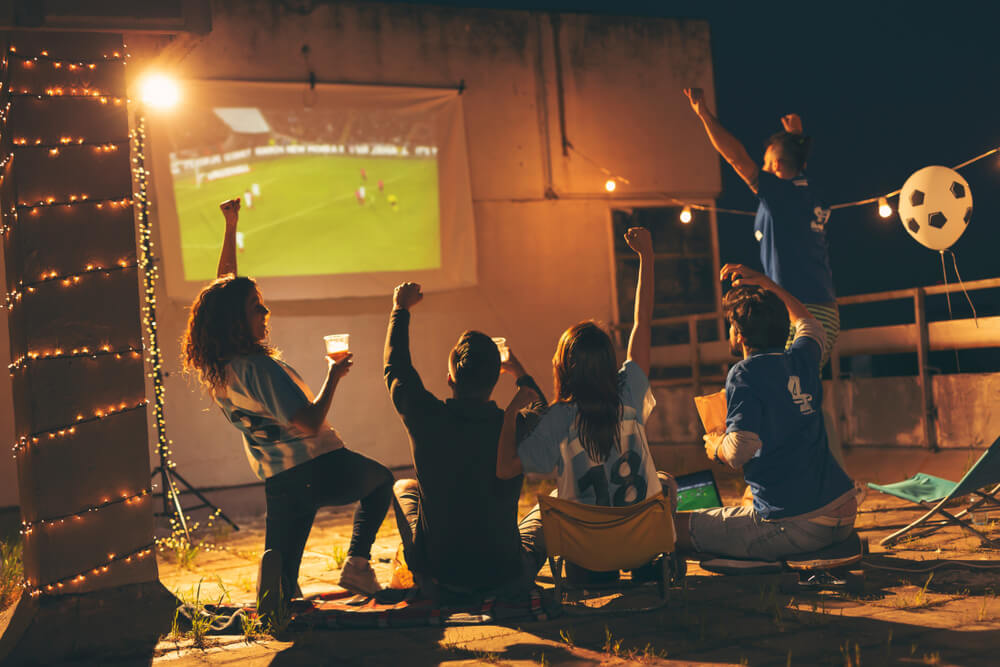
A lumen is a unit of measurement of light visible to the human eye from a single source. The measurement is standardized by the American National Standards Institute, so if you see a certain number of lumens associated with a projector, you can compare and contrast differing models.
As a frame of reference, a candle gives off 14 lumens. A typical 100-watt bulb would measure around 1600 lumens. A sunny day, on the other hand, can produce as much as 100,000 lumens. For a projector to create a clear, visible, vibrant image, a certain number of lumens are required, depending on the environmental conditions, the content, and the screen size.
Projecting in Daylight and Other Ambient Light
If you were projecting on a small screen or at night, 800 lumens or even less might suffice. If you want to project in daylight, however, you’re going to want at least 2500 lumens. For enjoyable brightness, contrast, and accurate color without question marks or concerns, you want to go for 3600 lumens. Because projecting in daylight can be tricky, we recommend that you don’t hold back on the lumens. Unless you are a technical wizard, you will probably need all the help you can get to achieve excellent picture quality that everyone can see.
Projecting on a bright, sunny day will likely be a challenge. Ambient light, which includes street lights or the glow of the moon, can compete with your projector, making it more difficult for people to see the images clearly. Projecting on a wall or a huge screen may also be challenging, necessitating more lumens for good results. A projector offering 5000 lumens or more will be able to handle most conditions.
Screen Size Matters
The light level of the projection environment is not the only factor to consider when deciding how many lumens you need for an outdoor projector. You also need to think about how big your screen will be. The bigger the screen, the more lumens your projector will require to fill it.
There are few things as disappointing as a projection that is not quite visible. We think that it’s always best to overestimate the lumens you will require rather than being too conservative and hoping that you will have enough.
For this reason, buying the best projector within your budget is often a good idea. It means that you are more likely to enjoy using it in a variety of conditions. And if your needs change – for example, you decide to use a larger screen or you decide to project in a brighter location than expected – you will be flexible. Whatever content you want to project – whether TV, movies, games or other content – a high-quality projector with more lumens will give you peace of mind and flexibility.
LED, Lamp, and Laser Projectors
Now that you have an idea what lumens are and how many will be required for you to enjoy projecting your chosen content, check out the main types of projector on the market and how each one may align with your needs.
- LED projectors deliver sharp images and precision, making their projections appear bright, but be aware that they are normally below 2000 lumens. While this could technically make them less effective as outdoor projectors, their LED technology makes them appear brighter.
- Lamp projectors normally offer more than 2000 lumens. A basic lamp projector, therefore, should be able to handle projection outdoors in favorable environmental conditions and as long as the screen is not too big.
- Laser projectors easily offer north of 3500 lumens. The lumens can sometimes be extended with accessories.
A projector intended for multipurpose rooms – and indoor and outdoor projection – would be best at around 2000 to 4000 lumens. The more lumens, the more flexibility you have when you use the projector. Projectors claiming high lumens should be less affected by ambient light, which means that you won’t have to control external light sources so much. It’s worth noting that a projector with higher lumens won’t necessarily cost more than another with lower lumens. It all depends on the make, brand, and what deals you can find.
Projectors can be expensive, so it’s wise to take the time to choose the right one for your needs. Get the right number of lumens to project under the conditions you desire. Because they can be pricey, it’s also an excellent idea to look for some good deals on projectors. Check out our deals on projectors and enjoy your projection experience.
Share this:




